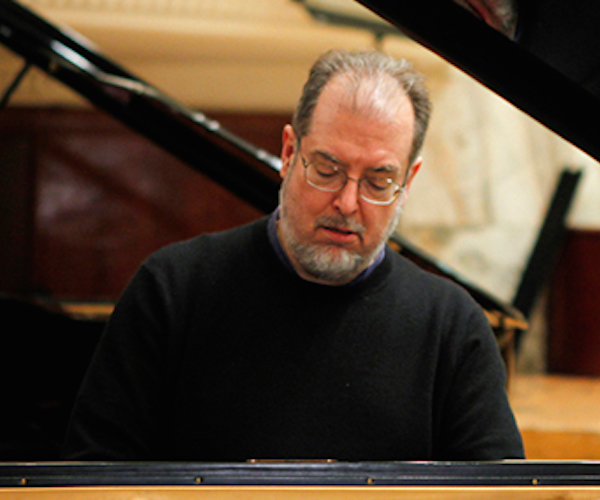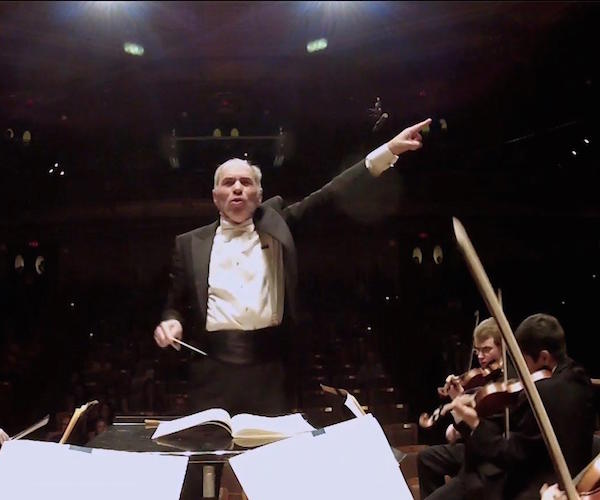Music Commentary: Top Classical Performances of 2018
By Jonathan Blumhofer
Our critic’s twelve favorite classical music performances that he reviewed this past year.
2018 was an anniversary year – actually several of them – for classical music organizations in Boston and around the world. Some were big: Leonard Bernstein’s 100th birthday, the centennial of Debussy’s death, commemorations of the end of World War 1, among them. Others, like the New England Philharmonic’s 40th-anniversary season, more local in emphasis. Several, though, resulted in the opportunity to reconsider some unjustly neglected repertoire. And, beyond the celebrations, there were simply some great concerts to be had in and around New England this year
Below are my twelve favorite performances that I reviewed for the Fuse this past year. Admittedly, it’s but a small, subjective sampling of the area’s offerings. But it’s one that give some sense of its breadth and depth, all the same. As ever, feel free to agree or disagree with my choices, add your own, etc.

Pianist Garrick Ohlsson. Photo: Music Worcester.
Garrick Ohlsson plays Scriabin and Schubert, January 28th
One of the year’s early triumphs was pianist Ohlsson’s appearance at Worcester’s Mechanics Hall in January. His wittily-introduced sampling of pieces by Alexander Scriabin lacked nothing for charm. But it was with Schubert’s evergreen B-flat-major Sonata that Ohlsson’s recital really elevated itself. His performance – fresh, intense, unpredictable yet completely logical – offered a thorough, personalized rethinking of one of the pillars of the solo-keyboard repertoire. Full review here.
Hub New Music plays Robert Honstein, February 5th
The highlight of HNM’s pre-Super Bowl matinee was the Worcester premiere of Robert Honstein’s Soul House. An inventive, whimsical homage to his childhood home in New Jersey, Honstein’s score is both a clever essay for a unique ensemble (flute, clarinet, violin, and cello) and a nostalgic look back on the not-so-distant past. Full review here.
Leila Josefowicz plays Sheherazade.2, March 1st
Continuing the early-year Worcester-heavy connections…John Adams is a Worcester native and a former BSO clarinet substitute, but his music doesn’t turn up too often on the orchestra’s programs. So it was nice to have Alan Gilbert back in town in March to make the case for Adams’ 2014 violin-and-orchestra “dramatic symphony.” And what a case it was: a defiant, feminist-tinged rethinking of the Arabian myth, Adams’ score pulls no punches, featuring writing of extraordinary color, depth, and theatricality. It was played here, with exceptional command, by its dedicatee, Leila Josefowicz. Full review here.
Boston Musica Viva plays Adolphe and White, March 12th
BMV gamely commissions lots of new music – and then, like too few other groups, goes back and reprograms it. This spring’s Family Concert had one of those scores, Bruce Adolphe’s enchanting The Girl Who Loved Wild Horses, plus a captivating premiere in Barbara White’s The Wrong Child. Neither piece talks (or plays) down to its intended young audience, featuring writing of striking rhythmic and harmonic complexity. White’s score, a kind of brilliant, young-person’s-guide to all the wild sonic possibilities you can create with a Pierrot ensemble, was particularly fresh; it’s one I can’t wait to hear again. Full review here.

Giancarlo Guerrero, Mary Wilson, and Laila Robins with the Boston Symphony Orchestra, the Tanglewood Festival Chorus, and the Choir of St. Paul’s Harvard Square. Photo: Robert Torres.
Guerrero conducts Bernstein’s Kaddish, March 15th
The Bernstein centennial was good to Boston: nearly all of the composer’s major works turned up (sometimes more than once) on the programs of the city’s major ensembles. Perhaps the most striking one to grace Symphony Hall’s stage in 2018 was Bernstein’s flawed, uneven Kaddish Symphony. A setting of the Jewish prayer for the dead, its tendentious narration overshadows some compelling music; before this year, the BSO – which had commissioned the score – had only played it once before, in 1964. One hopes the piece will return sooner than not, though, on account of the spectacular, kinetic reading Giancarlo Guerrero drew from a locked-in BSO, Tanglewood Festival Chorus, and speaker Laila Robins. Full review here.
Los Angeles Philharmonic plays Varèse, April 25th
For one of the most exhilarating performances of 2018, look no further than the LA Phil’s sensational account of Edgard Varèse’s knuckle-busting (and sometimes deafening) Amériques. It’s not the 1920’s most original piece – as this concert made clear – but it’s plenty fresh, daring, and, amazingly enough, these days a genuine crowd-pleaser. Full review here.
Boston Philharmonic Youth Orchestra plays Ives, May 7th
There was an elegiac quality to the BPYO’s spring season finale: the program was both a commemoration of the end of World War 1 and a farewell to the ensemble’s graduating members. And its inclusion of Ives’ visionary The Unanswered Question served as a memorial for guest conductor John Heiss’s son, Frank, who had died unexpectedly a few weeks earlier. The latter, given the full spatial treatment – string aureoles emanating from the lobby in Sanders Theater framing a solo trumpet up in the balcony and a quartet of flutes onstage – was this packed year’s unforgettable moment. Full review here.
BLO does Bernstein, May 19th
Boston Lyric Opera’s contribution to the Bernstein centennial was among 2018’s smartest programs: a double-bill combining the one-act opera Trouble in Tahiti and the 1988 song cycle Arias and Barcarolles. Presented in the North End’s Steriti Memorial Ice Rink, it was a production that was cleverly staged; well-cast; impressively-played and -sung; and, ultimately, profoundly touching. Lenny, one imagines, would have loved it. Full review here.

David Lobel conducing the New England Conservatory Philharmonia. Photo: NEC.
Carl Nielsen’s The Four Temperaments at NEC, October 2nd
Jordan Hall is not particularly big. Carl Nielsen’s Symphony no. 2 gets mighty loud. Experiencing the NEC Philharmonia’s performance of that piece in that space in October was perhaps a bit like rowing a kayak across Boston Harbor during a Nor’easter, intense and in-your-face (if not quite as life-threatening). But, boy was it exhilarating. David Loebel drew a commanding performance from his forces here, one that was satisfyingly preceded by some rare bits of Americana. Full review here.
Nelsons conducts Mahler’s Resurrection Symphony, October 25th
One of the privileges of hearing Andris Nelsons over the four-plus seasons of his BSO music directorship has been watching him grow as an interpreter of large-scale, late-Romantic symphonic works. The Mahler Symphony no. 2 he led with the Tanglewood Festival Chorus in October was a case-in-point: meticulously rehearsed and tightly directed, it never failed to breathe and lacked nothing for intensity or purpose. As conductors go, Nelsons’ still a young guy (just forty) and, twenty years on, his Mahler may sound very different. But that doesn’t diminish the accomplishment – or thrill – of this performance. Full review here.
Boston Philharmonic plays Ein Heldenleben, November 17th
A stirring highlight of the BPO’s 40th-anniversary season was this concert, which featured Matthew Vera as the last-minute fill-in for concertmaster Joanna Kurkowicz, and dispatching some of the most dizzying orchestral solos in the repertoire with aplomb. On top of that, you had a performance of this 120-year-old favorite of such sweep and excitement (not to mention excellent balance and superb ensemble work) that it was impossible not to be completely carried away by it. Full review here.
Boston Philharmonic Youth Orchestra plays Shostakovich, November 25th
The BPYO’s fall concert culminated in Dmitri Shostakovich’s Symphony no. 10. One of the weightiest, most powerful symphonies of the 20th century, it’s anything but child’s play. This so-called “youth orchestra” dispatched it with a lightness of touch that was breathtaking – conductor Benjamin Zander led an interpretation that strikingly drew out the music’s dance-like character – but also forceful and inevitable. Some mighty Rachmaninoff and Weber had preceded the Shostakovich but this 1953 masterpiece was the afternoon’s – and one of the year’s – highlight, sounding as prescient and necessary
Jonathan Blumhofer is a composer and violist who has been active in the greater Boston area since 2004. His music has received numerous awards and been performed by various ensembles, including the American Composers Orchestra, Kiev Philharmonic, Camerata Chicago, Xanthos Ensemble, and Juventas New Music Group. Since receiving his doctorate from Boston University in 2010, Jon has taught at Clark University, Worcester Polytechnic Institute, and online for the University of Phoenix, in addition to writing music criticism for the Worcester Telegram & Gazette.
